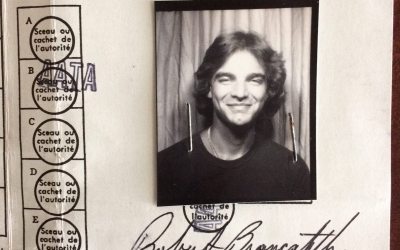In the summer of 1980 I was 23 and found myself a long way from home. I was living in a tent in my uncle’s yard in San Jose, California with a fellow conspirator and vagabond who was also my mentor and English professor at Ursinus College. We played chamber music on alto and soprano recorders after having traveled for months throughout Europe and North America. We drank gin and tonic. It was a good life. I still have the Eurail pass and recorders.
When the money ran out, I had to get a job. I was lucky enough to land one as a host and tour guide at Paul Masson Champagne Cellars in Saratoga, California. This was the bottling facility where I learned about wine and wine-making (photo). The facility was used primarily for bottling sparkling wines like “Crackling Rosé” and Brut Champagne.

However, the champagne wasn’t the only brut. At 23, I had an intense bite with a complex finish; something of a cross between Woody Allen and Goethe’s young Werther. I say Werther, because I met my future wife, Heidi, there. We had a barrel of fun, but that’s another story.
As a host, I worked in Paul Masson’s tasting hall, pouring wine and answering questions from visitors. We would get crowds of people–locals, vacationers, tourists. Buses from chartered tour companies came in regularly with visitors from all over the world. It was a great opportunity to meet people, learn about wine, and develop public relations skills. Well, it would have been a great opportunity, but I wasn’t mature enough to handle all the excitement. I wasn’t the only one horsing around and acting out, but you can’t run a business like a fraternity. I am convinced that the only thing that saved me from being fired was a very kind and patient manager named Terri Silva. I like to think we amused her.

One day a group finished its tour and came into the tasting room where I was working. A guy not much older than me and his friend came up to the bar to sample the wines. Following procedure, I asked him which white wine he preferred to start with. He stared at me, rolled his eyes back, and answered with such a stutter that I assumed he was kidding. It was so bad, it was the kind of stutter you would do only if you weren’t very good at mimicking a real one. I figured he was pulling my leg, especially since he had long hair and a goatee–a cool dude. So, I answered in an even more exaggerated stutter, dragging it out to a flourished finish. There was one problem. Turned out the guy’s stutter was real.
Surprisingly, he did not reach across the bar and grab me by the throat or slap me. He stared back in disbelief. I blushed in humiliation. Then I mumbled an apology and slunk away. I have carried that memory around for thirty-five years; not every day, mind you, but it ranks right up there on my list of regrets along with not going to the senior prom with Anna Wu when she invited me. Actually, these two regrets have kept me up at night. However, I am glad to report no longer. I have found peace, at least regarding the stutterer. With Anna, we’ll see.

This week I gave a workshop to a group of retail employees. Afterward, one came up and asked a technical question about a piece of merchandise. He stared at me, rolled his eyes back, and stuttered so badly that his head rocked. He took twice as long as the guy in the tasting hall. He also looked twice as desperate. I could see his eyes searching me to see how I would react. Instantly, my mind raced back to Paul Masson. Finally, here was my chance to make amends for the damage of thirty-five years ago.
And I did. I answered calmly, slowly, with reassurance in my voice, and not one twitch of a facial muscle. I actually felt myself observing me, judging my reaction as if in an out-of-body experience. I think the employee felt relieved. I know I did.
Here’s the thing. Even after confessing a sin and being forgiven, the effects of that sin remain. They are real and lingering. Robert DeNiro had to haul that sack up the cliff in The Mission (1986), not because he didn’t receive forgiveness but precisely because he did receive it. He had to deal with its effects on an individual, subjective level. No amount of reasoning could convince him otherwise.
I have learned to deal with sin in two ways: (1) making amends for its effects to the degree I am able, and (2) putting up with all the smartasses who think they are cute and remind me so much of me it hurts. I suppose that means being more like Terri, who could have fired me on the spot but chose to hang on. Neither of these is so bad, because, if you live long enough, eventually things come around full circle. It’s just that some circles are larger than others.
Image credit: feature by Svetlana Gumerova. This post is dedicated to the memory of Jim Franklin, host extraordinaire and grand raconteur. He was a gentleman. And to Ann Winters, blog follower and fellow traveler across the ages. Want more? Go to Robert Brancatelli. The Brancatelli Blog is a member of The Free Media Alliance.



Happy Thanksgiving to you and yours! ~Molly
Thanks very much, Marion. I appreciate the comment. Have a great Thanksgiving.
I like the reference to the movie The Mission and the nicely placed example of experiencing the effects of sin. DiNiro’s character carrying his literal and metaphorical ‘past life’ on his back while climbing the waterfall is one of the powerful scenes in the movie. Very nice touch in your writing!